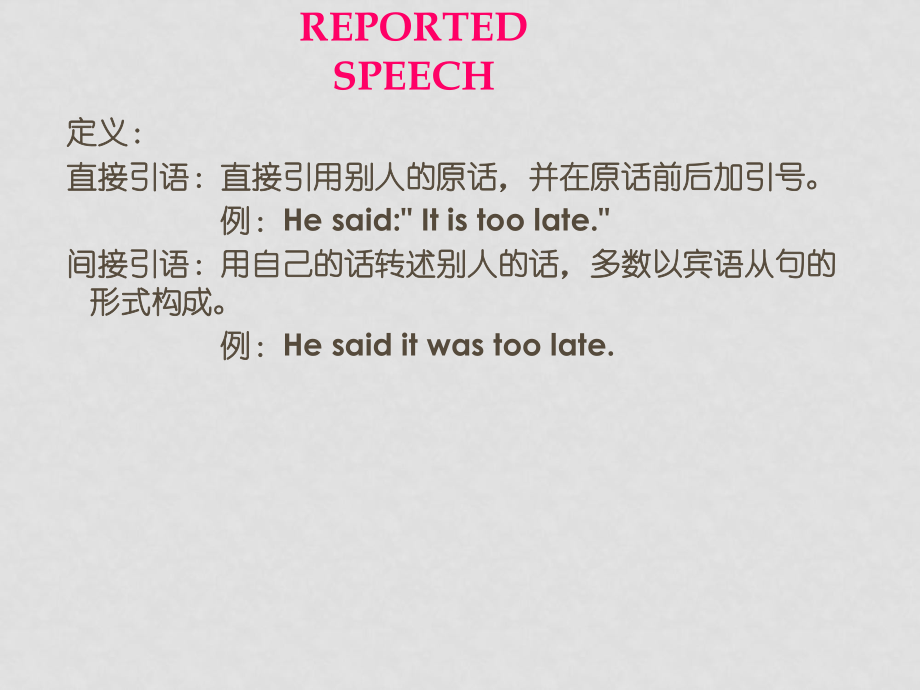《高中英語(yǔ)必修5 L14的語(yǔ)法知識(shí)北師大版高中英語(yǔ)必修5》由會(huì)員分享���,可在線閱讀���,更多相關(guān)《高中英語(yǔ)必修5 L14的語(yǔ)法知識(shí)北師大版高中英語(yǔ)必修5(29頁(yè)珍藏版)》請(qǐng)?jiān)谘b配圖網(wǎng)上搜索��。
1����、REPORTED SPEECH定義:定義: 直接引語(yǔ):直接引用別人的原話,并在原話前后加引號(hào)�。直接引語(yǔ):直接引用別人的原話,并在原話前后加引號(hào)���。 例:例:He said: It is too late. 間接引語(yǔ):用自己的話轉(zhuǎn)述別人的話����,多數(shù)以賓語(yǔ)從句的間接引語(yǔ):用自己的話轉(zhuǎn)述別人的話���,多數(shù)以賓語(yǔ)從句的形式構(gòu)成��。形式構(gòu)成���。 例:例:He said it was too late. 人稱(chēng)的變化:人稱(chēng)的變化:在間接引語(yǔ)當(dāng)中��,人稱(chēng)要根據(jù)句子的意思做出相應(yīng)在間接引語(yǔ)當(dāng)中����,人稱(chēng)要根據(jù)句子的意思做出相應(yīng)的變化�����。如:的變化�����。如:第一人稱(chēng)第一人稱(chēng) I /we 第三人稱(chēng)第三人稱(chēng)her/him/themeg: L
2�����、isten to me,please! John says. John asks us to listen to him. She said: I am hungry. She said she was hungry. 第二人稱(chēng)第二人稱(chēng) you 第一第一/ 三人稱(chēng)三人稱(chēng) me/us/her/him/themJohn ordered us to repair an old pump.John ordered them to repair and old pump.I want you to repair an old pump. John says .第三人稱(chēng)第三人稱(chēng) she /he/them/
3����、 不變不變?nèi)宋锩Q(chēng)人物名稱(chēng)John/Natureao Natureao tells me/them. to give her a letter.“Please give her a letter” Natureao tells.第二:時(shí)態(tài)變化第二:時(shí)態(tài)變化直接引語(yǔ)變間接引語(yǔ)時(shí)�,直接引語(yǔ)變間接引語(yǔ)時(shí)���,間接引語(yǔ)間接引語(yǔ)的時(shí)態(tài)要與的時(shí)態(tài)要與主句主句的時(shí)的時(shí)態(tài)一致���。態(tài)一致。 報(bào)道報(bào)道過(guò)去過(guò)去某人所說(shuō)的話��,間接引語(yǔ)的時(shí)態(tài)要改變���。某人所說(shuō)的話�����,間接引語(yǔ)的時(shí)態(tài)要改變。其規(guī)律如下圖其規(guī)律如下圖: 直接引語(yǔ)直接引語(yǔ) 間接引語(yǔ)間接引語(yǔ) 一般現(xiàn)在時(shí)一般現(xiàn)在時(shí) 一般過(guò)去時(shí)一般過(guò)去時(shí) 一般將來(lái)時(shí)一般將來(lái)時(shí) 現(xiàn)在進(jìn)行時(shí)現(xiàn)
4�、在進(jìn)行時(shí) 現(xiàn)在完成時(shí)現(xiàn)在完成時(shí) 過(guò)去完成時(shí)過(guò)去完成時(shí) 將來(lái)進(jìn)行時(shí)將來(lái)進(jìn)行時(shí) 將來(lái)完成時(shí)將來(lái)完成時(shí) 一般過(guò)去時(shí)一般過(guò)去時(shí) 過(guò)去完成時(shí)過(guò)去完成時(shí) 過(guò)去將來(lái)時(shí)過(guò)去將來(lái)時(shí) 過(guò)去進(jìn)行時(shí)過(guò)去進(jìn)行時(shí) 過(guò)去完成時(shí)過(guò)去完成時(shí) 不變不變過(guò)去將來(lái)進(jìn)行時(shí)過(guò)去將來(lái)進(jìn)行時(shí) 過(guò)去將來(lái)完成時(shí)過(guò)去將來(lái)完成時(shí)注意:注意:1.直接引語(yǔ)為直接引語(yǔ)為客觀真理客觀真理時(shí),間接引語(yǔ)時(shí)態(tài)時(shí)�����,間接引語(yǔ)時(shí)態(tài)不變�,仍用一般現(xiàn)在時(shí)。不變�����,仍用一般現(xiàn)在時(shí)。 Teacher told us: The moon moves round the earth. Teacher told us the moon moves round the earth. 2
5���、.直接引語(yǔ)為直接引語(yǔ)為一般過(guò)去時(shí)并且與具體時(shí)間狀語(yǔ)連用一般過(guò)去時(shí)并且與具體時(shí)間狀語(yǔ)連用時(shí)�,間接時(shí)��,間接引語(yǔ)仍用一般過(guò)去時(shí)���。引語(yǔ)仍用一般過(guò)去時(shí)��。 She said: I went to England in 1998. She said she went to England in 1998. 3. 主句為一般現(xiàn)在時(shí)或一般將來(lái)時(shí)主句為一般現(xiàn)在時(shí)或一般將來(lái)時(shí)的時(shí)的時(shí)候���,間接引語(yǔ)時(shí)態(tài)不變。候����,間接引語(yǔ)時(shí)態(tài)不變。 He says: I bought you a book yesterday. He says that he bought me a book yesterday. 第三:第三:指示代詞���、
6�、時(shí)間狀語(yǔ)�����、地點(diǎn)狀語(yǔ)和動(dòng)詞指示代詞、時(shí)間狀語(yǔ)�����、地點(diǎn)狀語(yǔ)和動(dòng)詞的變化的變化 直接引語(yǔ)直接引語(yǔ) 間接引語(yǔ)間接引語(yǔ) 指示代詞指示代詞this that these those 時(shí)間狀語(yǔ)時(shí)間狀語(yǔ)now then today/tonight that day/that night yesterday the day before this week/year/term that week/year/term two years ago two years before tomorrow the next/following day next year the next year 地點(diǎn)狀語(yǔ)地點(diǎn)狀語(yǔ) here
7�����、 there 動(dòng)詞動(dòng)詞 come go bring take 第四:句式變化1.陳述句陳述句變間接引語(yǔ)時(shí)�,變間接引語(yǔ)時(shí),用用that連接連接�����。 如:如:She said: I am a girl. She said that she was a girl. (that可以省略可以省略) 2.一般疑問(wèn)句�����,選擇疑問(wèn)句和反意疑問(wèn)句變間接引語(yǔ)時(shí)���,要一般疑問(wèn)句,選擇疑問(wèn)句和反意疑問(wèn)句變間接引語(yǔ)時(shí)��,要用陳述語(yǔ)氣,并要加連詞用陳述語(yǔ)氣���,并要加連詞if或或whether����。 例如:例如:She asked me: Are you Mr. Li? She asked me if I was Mr. Li. She
8�、 asked us: Do you want to go on a picnic? She asked us if we wanted to go on a picnic. 3.特殊疑問(wèn)句變間接引語(yǔ)要用特殊疑問(wèn)特殊疑問(wèn)句變間接引語(yǔ)要用特殊疑問(wèn)詞引導(dǎo)。詞引導(dǎo)�。 例如:例如:How much have we spent on petrol this year, Susan asked her husband. Susan asked her husband how much they had spent on petrol that year. 4.祈使句變間接引語(yǔ),祈使句變間接引語(yǔ)�����,一改二變?nèi)?/p>
9����、四去一改二變?nèi)铀娜ァ?一改:一改:said (to) 改為改為asked或或told, ordered等等 二變:二變:said to 的賓語(yǔ)變?yōu)榈馁e語(yǔ)變?yōu)閍sked等的賓語(yǔ)等的賓語(yǔ) 三加:三加:即在動(dòng)詞原形前加即在動(dòng)詞原形前加to,使成為動(dòng)詞不定式使成為動(dòng)詞不定式 四去:四去:去掉去掉please 例:例:He said to her: Dont take the book away. He asked her not take the book away. Complete the ruleWhen we report peoples requests or orders we use
10����、the pattern:infinitive (to +verb)ask /tell /order somebody +_When the order or request is negative, we use the pattern: ask / tell /order somebody + + infinitive (to verb)not5.感嘆句變?yōu)殚g接引語(yǔ)感嘆句變?yōu)殚g接引語(yǔ) What awful weather it is! she said. She complained about the awful weather. Report these orders and reque
11、sts. Use the beginnings provided.1. “Could you lend me a Pen ?” Peter asked me2. “Dont lose the receipt. Its important.” The salesgirl instructed the shopper not to lose the receipt.to lend him a pen.4. “Can you give me a lift home?” Mary asked John 3. “Check for errors, Please.” The teacher ordered
12���、 the class to check for errors. to give her a lifthome/ if he could give her a lift home.5. “Dont drink that liquid. I dont think its water.” The boy advised the girl not todrink that liquid.6. “Read the text and answer the comprehension questions.” The teacher told the students to read the text and
13�����、 answer the comprehension questions.The manager of an office is ill and, on the phone, gives her assistant instructions for the people in the office. Rewrite the instructions starting with Tell.1. Mrs. Smith must cancel my trip to Paris.2. John must move Peters desk to room 308. Tell Mrs. Smith to c
14��、ancel my trip to Paris.Tell John to move Peters desk to room 308.3. He shouldnt announce the results before the end of the month. Tell him not to announce the results before the end of the month.5. Mary mustnt send the charts off before I come back. 4. He should consult Mr. Jensen about the new acco
15��、unt on the 24th.Tell him he has to pick up Mr. Jensen from the airport on the 24th.Tell Mary not to send the chartsoff before I come back.6. She should prepare the information I need for my presentation.Tell her to prepare the information I need for my presentation.Read the notice on how to behave o
16��、n the first day in a new job. Report each piece of advice.The notice advises people to be friendly and kind, and tells them not to wear casual clothes.The notice tells people not to share very personal information.The notice tells people not to try to make friends with the boss.The notice tells people to listen rather than speak and learn as much as possible about the joband the company.The notice tells people to work hard and not to spend too much time chatting or resting.The notice tells people to keep their desk tidy at all times.The notice tells people not to quarrel with anyone.
 高中英語(yǔ)必修5 L14的語(yǔ)法知識(shí)北師大版高中英語(yǔ)必修5
高中英語(yǔ)必修5 L14的語(yǔ)法知識(shí)北師大版高中英語(yǔ)必修5

